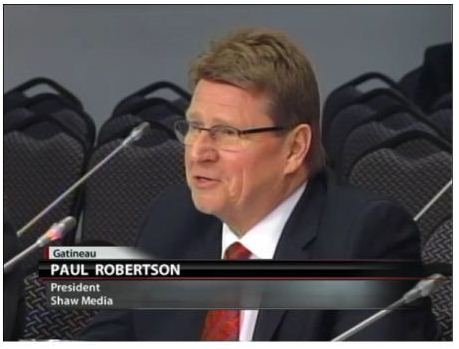
GATINEAU – CBC’s call for greater regulatory flexibility to help it deal with the new realities of the broadcasting environment got some support on the fourth day of its licence renewal hearing.
Shaw Communications Inc. appearing later Thursday afternoon, said that all broadcasters should have additional room to operate in an environment that is being challenged by the emergence of non-traditional players such as Apple, Google, Netflix and Amazon.
“Regulatory micro-management is neither necessary nor efficient,” Paul Robertson, president of Shaw Media, said in his opening remarks. “All of us in the broadcasting sector require the ability to respond quickly to the dramatic changes that are taking place in our market – and appropriate flexibility must also be afforded the CBC.”
He referred to the challenges that undoubtedly lie ahead for broadcasters in competing with unregulated entities for programming rights. Robertson said that during recent trips to Hollywood to purchase programming, the company has felt the presence of these new players and it’s expected to get more difficult, more expensive, to gain rights to programming. They may not be bidding on Shaw’s programs now, “but they are absolutely looking at second-windows of our hit shows, maybe next-day viewing, that would effectively carve audience and revenues out of the regulated broadcast system,” Robertson (pictured in a screen cap from CPAC.ca’s stream of the proceeding) said.
The Canadian Media Production Association also agreed that some degree of flexibility is fair. “We do recognize that the CBC is under pressures and that you have a significant challenge in front of you in trying to balance what are probably… unbalanceable issues,” CMPA president and CEO Michael Hennessy said. “We’re not trying to make things so inflexible for the CBC that they can’t adjust.”

The independent producers group does have reservations about giving the public broadcaster too much latitude, however. “In our view, such flexibility would amount, amongst other things, to virtually no requirements to commission independently-produced programming, the potential for even greater reductions in original children’s programming, as well as no firm commitments to film or to regional production,” Hennessy said during his opening remarks.
The CMPA recognizes that even though one aspect of CBC’s proposal calls for about 3% of its programming to be independently produced, it will produce much more than that. “It’s just we don’t think there should be no expectation or no conditions of licence in areas (such as drama and documentaries, children and youth and regional programming) because you have to have targets,” said Hennessy. You can’t simply have the flexibility to reduce programs that the CBC is probably uniquely mandated and expected to provide. And I think that’s where we’re coming from.”
The CMPA raised the terms of trade issue as well and lamented the fact that an agreement with CBC has still yet to be signed, while it has one in place with the private broadcasters. The lack of such an agreement with the CBC has been detrimental to independent producers, argued the association. It noted that the public broadcaster imposes terms that “are far more onerous” than those from the private broadcasters and this creates distortions to the system.
“A workable agreement with the CBC is critical to helping producers build or, in many cases, simply sustain their businesses, so that they can produce more and better Canadian shows, and increase the quality and diversity of the programming available to Canadian audiences. That is what our deal with the privates is doing,” said Hennessy.
The fourth day of the hearing concluded with the Radio Council of the Canadian Association of Broadcasters urging the CRTC to reject CBC’s proposal to add national advertising on Radio 2 and Espace musique.
Charles Benoit, executive VP of Astral Radio argued that allowing advertising on these two radio properties would not only have a negative impact on the existing commercial radio market, but would amount to the introduction of new commercial radio services.
The hearing continues today and through next week.


